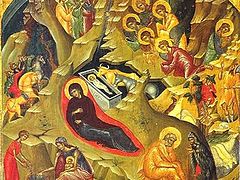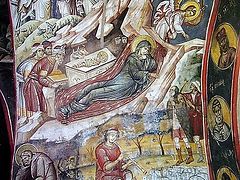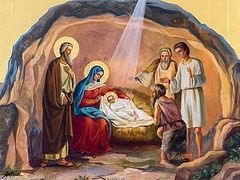This sermon was delivered on the feast of the Nativity of Christ—December 25, 2018 [n.s.], celebrated by the Church of Cyprus according to the new calendar.
These days are so saturated with the presence of the great feast of the Nativity of Christ that it is impossible to talk about anything other than their meaning. It is impossible to stand aside because this is such a bright feast in the life of the Church and all of us that the fact of the incarnation of the Lord for mankind takes our breath away. So today during our meeting we will try to say a few simple words about this most important event.
The experience of Church life and that of the Holy Fathers confirms that every time we stand before God—whether we are praying, or standing in church on great festivals, or are in any other situation—when we meet with the Lord, this standing before Him has two distinctive characteristics. Firstly, we are filled with joy as we see how great God’s love for mankind is. Tender emotion and thankfulness fill our hearts when we realize how great God’s gift is. But, secondly, our standing before the Lord Jesus Christ is a judgment for us at the same time. It is especially so on great feasts, through which we remember the life of Christ on earth, His preaching, and deeds; all these events judge man, and this judgment is salvific. This judgment does not condemn us—it saves us.
Thus we celebrate the feast of the Nativity of Christ, on the one hand, in order to feel the Lord’s great love for us and fill our hearts with deep gratitude to Him for all the innumerable benefactions; and, on the other hand—which is much more beneficial to our souls—to judge ourselves. Because, as the Apostle Paul says, if we condemn ourselves, the Lord will not judge us. That is, if we condemn ourselves in this life, we will not be judged on the last day because judgment will come here, at this stage of our existence.
Now we are standing before the great feast of the Nativity of Christ, staying in its atmosphere in order to examine ourselves, pass judgment on ourselves, taking everything that the Lord did for our salvation as the criterion. For we know that the Lord did not do anything “by accident” and did not act depending on combinations of circumstances; rather, everything (to every detail) was directed by Him and took place according to His will. It was His will to be born at that time, in that way and in that place.
The fact that by the feast of the Nativity of Christ we subject ourselves to judgment is reflected in the Lives of the Saints. We see that every time something happened in their lives they compared themselves and their lives with Christ’s life. We can often hear from pious people that in difficult life situations they recall events from Christ’s life, trying to understand whether their actions correlate with those of the Lord. For we want to believe that a Christian is someone who strives to imitate Christ as far as his human nature allows; and where he is unable to imitate he makes up for this through repentance, humility, sorrow, or the spiritual labor he performs inside himself.
On the holy days when the Church sings of the Lord’s great condescension to mankind and through the glorious hymns lays bare the deepest theological meaning of the feast, most virtuous men and elders stand in the altar as if condemned, contemplating the events associated with the Nativity of Christ. When Elder Ephraim of Katounakia returned from his pilgrimage to the Holy Land, we bombarded him with questions about the holy places. We expected him to say how the places of the scourging of Christ and Golgotha excited him. But he said he was particularly impressed by the Grotto of the Nativity in Bethlehem because there in his mind he travelled back to the events that had happened in the cave 2,000 years ago. He confessed that earlier, living in his little hermitage in Katounakia, he had thought and felt he meant something, he had done something in this life, since he lived in the desert. But from the moment he saw where Christ was born he became truly silent and his ego fell. “Christ closed my mouth there,” Fr. Ephraim said. For Christ was born in a cave, persecuted and despised by everybody, and even had no place to lay His head (cf. Lk. 9:58). No one but the ordinary Shepherds and Persian Magi knew that the greatest event in the human history happened that night—the incarnation of God that took place in utter poverty, humility, calm, and total obscurity.
Every time life tests us by various problems, we place ourselves before the cave of Bethlehem to judge whether what we do and strive for corresponds to what the Lord did at the time of His Birth. And we can judge our entire lives according to the same criterion too.
In the Lives of the Fathers you must have read about the people who were under the sway of passions—for instance, rancor, vengefulness, or anger, which is considered to be the mother of all passions. To help someone break free from this passion the spiritual fathers did not initiate any “judicial proceedings” to prove what is good and what is bad by logical arguments. A simple conversation about Christ’s life was enough to convince those people (and us afterwards) that all they were doing did not become them as Christians. We all feel this every time we succumb to emotion when our worldly logic rises and demands justice—worldly justice and justification at that—asserting our rights vigorously. And we cannot respond to this challenge because the arguments (that our logic suggests us) are often nourished by human weakness. In this situation all we need is to stand before the event of the Nativity of Christ in our minds and ask ourselves: “Is what you want, or what you do, or what you strive for, or what you think about, in the spirit of the Lord’s life? Did the Lord Himself act this way? Examine this matter, place yourself beside Christ, and if you conclude that your actions do not contradict the Lord’s life, you can move forward boldly.”
From the moment Christ became man and the angels sang “…and on earth peace,” these words became an excellent motto for the entire world because today the price of peace is great and is not easily maintained. Of course, many understand “peace” as absence of war, disturbances, or unrest. However, Christ said: I came not to send peace, but a sword (Mt. 10:34). But what do we have? The angels proclaiming one thing and Christ proclaiming the opposite? In reality, the “peace” that came to earth is the Lord Himself Who became man so that we could love Him. Thus He showed us that our relationship with God is not just theory. You may be a faithful adherent of a philosophical system, but you will never be able to enter into a relationship of love with it; because no matter how much you love this system—it will never return your love. But it is the opposite in the Church. Here we do not encounter any theories. The Word did not become some ideology or philosophy—He became flesh, became man precisely so we could love Him. And once we have come to love Him, we understand that He came to love us before that. At the moment we decide to struggle in order to love Him, once we have made the first step towards Him, we immediately feel His great love for us. He had this love for us before we made the first step towards Him. This mystery is possible in the Church alone. That is why Christ, Who is peace for this world, became the object of love. Not an object of faith! After all, we must go beyond the scope of faith and hope and live in love. As the Apostle Paul said: now abideth faith, hope, charity, these three; but the greatest of these is charity (1 Cor. 13:13). For only love is the empirical and ontological fact through which we can really feel our relationship with God.
All who loved the Lord to the end walked the same path. Let us take the holy Protomartyr Stephen the Archdeacon, who, imitating the Lord, testified to his love for Him. After the Jews had seized him for preaching Christ, this commander of all the martyrs had to appear before the court at the Sanhedrim. During the trial he confessed his faith once again and his face lit up like that of an angel. The Jews condemned him to death, led him to the execution yard and started hurling stones at him. The Law of Moses saved this kind of execution for the most impious sinners. Just imagine that you have been thrown into some place with your arms and feet tied, and stones will be hurled at you until you die. Such a terrible and dreadful death! The Holy Tradition says that at that moment St. Stephen was praying—not for himself but for people, like Christ on the Cross. St. Stephen breathed his last, while praying for those who were stoning him, Lord, lay not this sin to their charge (Acts 7:60; cf. Lk. 23:34). His mind and heart were not occupied by anger at the Jews and not at the stones flying towards him; he was only praying that the Lord would not charge them with this sin. If we want to see at what moment St. Stephen became like Christ, we will easily find that he became Like the Lord not only at the moment of his martyrdom but first of all when his heart, mind and love were with those who were stoning him.
Today we have also commemorated another martyr—St. Maurice, who was subjected to the most horrible torments. The Synaxarion relates that he lived in the third century A.D. in the period of the persecution of Christians. St. Maurice was seized with other Christians. When he refused to renounce his faith in Jesus Christ, he was charged and subjected to the cruelest tortures. Then the Emperor took infant Photinus, St. Maurice’s son, and murdered him before his father’s very eyes. St. Maurice was told before that: “I will murder your child unless you renounce Christ.” Just imagine the horror of this choice! But St. Maurice remained faithful to Christ and his son was executed. Then the wicked emperor devised another torture. He took St. Maurice with his companions and ordered them to be led to the swamp. There they tied them to poles, smeared their bodies with honey and let them be eaten by the swarms of midges, gadflies, gnats and other insects that inhabited the area. But Maximian did not stop at this cruelty: he took Photinus’s body and laid it in front of Maurice who had been tied up. For ten days they suffered terrible torments until they breathed their last.
Millions of martyrs have given their lives for their faith in Jesus Christ since the time Jesus came to earth and brought peace. Why did they do this? They truly came to love Christ and experienced His great love, because Christ’s life began to speak in their hearts. The events we remember during the feasts were judgment for them, and they measured their lives according to Christ’s. On the one hand, they saw Christ, the manger, in humility, obscurity, silence, exile, misery; and, on the other hand, they saw themselves condemned. That is precisely why their judgment was over. For them Christ became Eternal Life and not the Judge. If we live our lives in the Church in this way, each time placing ourselves before God, judging our lives and allowing the Lord to pass His judgment on us in this life, we will avoid judgment on the Last Day.
How can we follow Christ and lead a life which is alien to Him at the same time? Through the experience of the Apostles and the Holy Fathers the Lord showed us very clearly that if the Holy Spirit dwells in us, then there must be the fruit of the Holy Spirit. The apostle said this clearly so that we could make no excuses: But the fruit of the Spirit is love, joy, peace, longsuffering, gentleness, goodness, faith, meekness, temperance: against such there is no law (Gal. 5:22-23). Take this list and examine yourselves; if you find that hatred dwells in you instead of love, despondency instead of joy, vengefulness instead of kindness and so on, you will understand what your situation is like. This judgment of yourself will bring salvation. A tree is known by its fruits. So if we perceive these holy feasts as judgment upon our lives, then we can say with certainty that they are salvific to us. They prompt us to perform spiritual labors through repentance, humility, and changing our ways; at the same time they inspire us to fall down to and seek the mercy of God with love, for we feel like The people which sat in darkness (Mt. 4:16). Let us say to the Lord: “Where would Thy light shine, O Lord, if not on those who live in darkness?” For it is when I realize that I live in darkness that I begin to seek the light. But if I deceive myself, believing that I am in the light, it is obviously darkness which will never allow us to see the true light.
Dear brothers, let us wish each other that these holy days can become saving to us, lead us to Christ Who through His life’s events will teach us a lesson. And we will understand that our relationship with God is not something abstract but that it has specific fruits and results. Let this Christmas season be filled with grace! Let the Lord be close to us forever and grand us the joy of His presence.
Amen.




